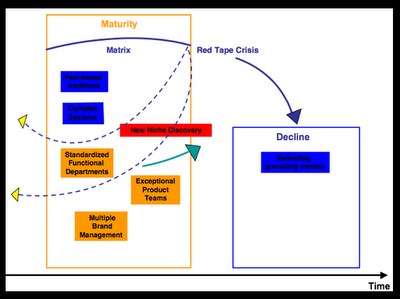Reports from the Knowledge Labs about our recent findings, research topics, and interviews with lifestyle leaders who are creating their own futures.
|
|
| |
How to stimulate your own powers of foresight. Consider the following thought provokers. Ask yourself, in these categories what are the brand new trends and forces? Which are the ones growing in importance? Which current forces are loosing their steam? Which have peaked or are reversing themselves? Which are the "wildcards" about to disrupt us in the future? POLITICAL AND TECHNICAL thought for food: Electronics, Materials, Energy, Fossil, Nuclear, Alternative, Other, Manufacturing (techniques), Agriculture, Machinery and Equipment, Distribution, Transportation (Urban, Mass, Personal, Surface, Sea, Subsurface, Space), Communication (Printed, Spoken, Interactive, Media), Computers (Information, Knowledge, Storage & Retrieval, Design, Network Resources), Post-Cold War, Third World, Conflict (Local, Regional, Global), Arms Limitation, Undeclared Wars, Terrorism, Nuclear Proliferation, Weapons of Mass Destruction, Governments (More/Less Power and Larger or Smaller Scale), Taxes, Isms: Nationalism, Regionalism, Protectionism, Populism, Cartels, Multinational Corporations, Balance of Trade, Third Party Payments, Regulations (OSHA, etc.) Environmental Impact, U.S. Prestige Abroad. SOCIAL AND ECONOMIC Food for thought:
Labor Movements, Unemployment / Employment Cycles, Recession, Employment Patterns, Work Hours / Schedules, Fringe Benefits, Management Approaches, Accounting Policies, Productivity, Energy Costs, Balance of Payments, Inflation, Taxes, Rates of Real Growth, Distribution of Wealth, Capital Availability and Costs, Reliability of Forecasts, Raw Materials, Availability and Costs, Global versus National Economy, Market versus Planned Economies, Generations: Y, X, Boomers, Elderly, Urban vs. Rural Lifestyles, Affluent vs. Poor, Neighborhoods and Communities, Planned or Organic Growth.
Got Knowledge?
|
|
| |
|
|
|
|
The Journal of 2020 Foresight
|
|
| |
|
Saturday, August 26, 2006

Avoiding Red Tape Decline for Crash-Test Dummies
Chapter Four: The Tribal Territories
By Steve Howard, CKO
The Knowledge Labs
Table of Contents
Chapter One: Basecamp
Chapter Two: The Ridge
Chapter Three: The Outpost
Chapter Four: The Tribal Territories
"It is this triple convergence -- of new players, on a new playing field, developing new processes and habits for horizontal collaboration -- that I believe is the most important force shaping global economies and politics in the early twenty-first century. Giving so many people access to all these tools of collaboration, along with the ability through search engines and the Web to access billions of pages of raw information, ensures that the next generation of innovations will come from all over Planet Earth. The scale of the global community that is soon going to be able to participate in all sorts of discovery and innovation is something the world has simply never seen before."
Thomas L. Friedman, “The World is Flat”
DOUBLE NICKEL RANCH. Mature organizations have vested interests in the way things were. While not overtly describing themselves as status quo advocates, many long-time Associates and Academics resist disruptive changes required to “jump paths” out of a declining trajectory.
Journal of 2020 Foresight: So, this is yet again a classic pattern. What brought you to the dance, practiced too much precludes you from learning the new steps that the audience now craves.
Explorer: Or if all you have in your toolbox is a hammer, every problem looks like a nail.
J2020F: What we’re talking about sounds a lot like what Trailblazer called the Old Game Strategy, an organization's response is to resist, so they don't initiate any internal changes. They believe that they can still be successful depending upon their ability to contain the change forces.
Explorer: That’s what they hope as they assume the ostrich position. But as anyone knows who has taken a popular change management class, abrupt change triggers a more radical disruption. And that gut-wrenching crisis forces everyone to accommodate it to survive, whether they want to or not.
Explorer: In reality, what is required is rapid, focused, specific change. As always with discontinuous change, there are severe limits to the change in behavior and beliefs that can be accomplished in the time available.
J2020F: Trailblazer says that companies often in a reinvention situation are there because they were unable to respond early when the forces of change were weaker.
Explorer: That’s right. And, the excessive tightening with the matrix organization in the mature stage that overcame divisional looseness, sets the stage for more trouble.
J2020F: The next major bonking?
Explorer: Yes, only this time the bonking is more like the car crash test of those safety dummies into the wall, but without their seatbelts fashioned.
J2020F: Or, driving down the street in your SUV and falling into a huge hole, again?
Explorer: Instead of taking a different street – in a hybrid vehicle – embracing the loosening required and the foresight to capitalize on a new niche.
J2020F: To break out of Red Tape Crisis requires the acquisition of or the return of the last two “red” Agent innovator tribes -- “Thought Leaders” and the Product Leader “R&D Laboratories” who produce new niche breakthrough products, right?
Explorer: Exactly. They’re the masters of collaboration tools and they participate in all sorts of discovery and innovation through their worldwide web-like networks.
Got Knowledge?
Copyright ©2002 - 2006 Aarnaes Howard Associates. All rights reserved worldwide.
9:12 AM
|
|
| |
|
|
|